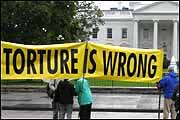Unitarian Universalists condemn 'torture' law
Several UU groups say Military Commissions Act allows torture and strips detainees of habeas corpus rights.
About 200 people, including many Unitarian Universalists, gathered in mourning attire in front of the White House on Tuesday, October 17, around a coffin draped with a black shroud bearing the words “Here lies the corpse of habeas corpus.” Protesters signed a statement decrying the Act at the same time that President George W. Bush was signing the bill inside the White House. After the group read the statement aloud at the White House gate, 16 people, in an act of civil disobedience, were arrested for refusing to leave the area.
The law authorizes the CIA to continue using aggressive interrogation tactics and sets out provisions for military trials of terrorism suspects. Critics charge that the bill gives the president the right to redefine torture and determine who is an enemy combatant and that the law eliminates prisoners’ right to challenge their detention—a violation of the writ of habeas corpus.
The General Assembly of the Unitarian Universalist Association of Congregations called for the end of American-sponsored torture in 2005. The UUA has repeatedly taken strong stands defending civil liberties, most recently with a Statement of Conscience in 2004.
The River Road Unitarian Universalist Church in Bethesda, Md., has been especially active in mobilizing against torture. Linda Gustitis, a longtime River Road member, organized the Washington-region chapter of the Religious Campaign Against Torture, which organized the Tuesday event at the White House. The Rev. Scott Alexander, senior minister at River Road, was among the speakers.
The church also organized a daylong interfaith conference on torture last June, which featured Sen. Carl Levin, ranking member of the Senate Armed Services Committee, Pulitzer Prize-winning reporter Seymour Hersh, and human rights activist Jennifer Harbury.
In another dramatic protest of the Military Commissions Act, a Connecticut interfaith group, Reclaiming the Prophetic Voice, put up two billboards along major highways showing the image of an Abu Ghraib prisoner and listing the name of four Connecticut politicians who supported passage of the Act.
“They Voted to Allow Torture,” the billboards say, with checkmarks next to the last names of Sen. Joseph Lieberman, a Democrat running for reelection as an Independent, and three Republicans running for reelection to Congress: Rep. Rob Simmons, Rep. Nancy Johnson, and Rep. Christopher Shays.
One billboard is on I-95 in Stratford; the other is on I-84 near Waterbury. The billboards were sponsored by Reclaiming the Prophetic Voice and IWagePeace.org and donated by John and Bruce Barrett, who own a billboard advertising company.
“We’ve been told that 100,000 people will be passing these billboards,” said the Rev. Kathleen McTigue, minister of the Unitarian Congregation of New Haven, Ct., and one of the founding members of Reclaiming the Prophetic Voice.
“It’s a practical, moral, and religious issue,” McTigue said about the group’s protest. “It’s practical because the information garnered through torture is untrustworthy. Also, if we practice torture, our own soldiers could be subjected to the same.” She continued, “It’s a moral issue because there is no way for us to use torture without knowing whether we’re torturing innocent people. And it’s a religious issue because we believe every human has a spark of the divine. If we use torture, we’re guilty of destroying holiness.”
“The candidates named in the billboards are scrambling to refute them,” McTigue said the day after the billboards were put up. “We’re hoping that their Democratic challengers will not distance themselves from this issue but instead will step forward and talk about some of the things they can do to defeat this law.”
The campaign office of Johnson, who represents the 5th Congressional District and is a Unitarian Universalist, did not respond to requests for comment.
In other parts of the country:
Members of the First Unitarian Society of Minneapolis visited the offices of their U.S. senators and three Congressional representatives on Wednesday and Thursday with copies of a sermon by the Rev. Dr. Kendyl Gibbons denouncing the Military Commissions Act.
“The sermon got us so fired up, we needed to do something,” said Madalyn Cioci, a member of the church’s social justice program. “We did this as an act of social witness. We realized that silence wouldn’t get us anywhere.”
The group met mostly with office staff. However, in one case, they met directly with Rep. Jim Ramstad (R-Minn.), who voted for the bill. “Initially he received us very graciously,” said Cioci. “And then he got defensive. We explained that we were there as a faith organization. After talking with him he did admit that there were provisions in the bill that he was uncomfortable with.”
University Unitarian Church in Seattle, Wash., cosponsored a mock trial of Secretary of Defense Donald Rumsfeld on October 7 at Seattle University. “He needs to be held to account” for American-sponsored torture, said Fred Capestany, a member of University Unitarian Church and one of the organizers of the event. More than 275 people attended the performance. Other sponsors included the American Civil Liberties Union of Washington, Amnesty International Puget Sound, Hate Free Zone Washington, and Seattle Fellowship of Reconciliation.
See sidebar for links to related resources.








